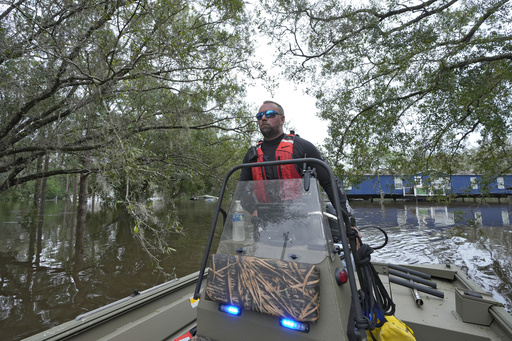Cleanup operations were initiated on Friday following the aftermath of Hurricane Milton, as residents began returning to their homes. The storm, which swept through Florida, generated tornadoes, disrupted power supply for millions, caused structural damage, and necessitated numerous rescue operations.
At least ten fatalities have been reported due to the storm, with considerable property damage occurring in various regions. However, the devastation inflicted by Milton was not as severe as anticipated. Despite the challenges posed by the heavy rains and subsequent flooding, rescue missions for both people and animals stranded in rising waters were still ongoing.
Governor Ron DeSantis cautioned residents to remain vigilant regarding potential dangers, including downed power lines and inundated areas. The storm, which impacted Florida in the middle of the week, arrived at a time when some communities were still recovering from the disastrous effects of Hurricane Helene just two weeks prior. President Joe Biden was scheduled to tour the affected regions on Sunday.
Hurricane Milton made landfall on Wednesday evening as a powerful Category 3 storm close to Siesta Key, a picturesque barrier island known for its sandy beaches along the Gulf Coast. The storm struck approximately 70 miles south of the Tampa Bay area, thus avoiding a direct hit on this densely populated region. As Milton traveled from the Gulf across to the Atlantic Ocean, it uprooted trees, downed power lines, and inundated neighborhoods. Before reaching land, it had already spawned deadly tornadoes.
In St. Petersburg, the storm caused the collapse of a crane involved in the construction of a 46-story building and severely damaged the roof of Tropicana Field, home to the Tampa Bay Rays baseball team. By Friday afternoon, power outages persisted for over 2 million Florida customers, according to reports from poweroutage.us.
As of Friday, officials confirmed at least ten casualties linked to the hurricane. Among the fatalities, six victims lost their lives when a tornado struck the Spanish Lakes Country Club Village in Fort Pierce, located on the Atlantic coast. In Volusia County, a 79-year-old woman in Ormond Beach and a 54-year-old woman in Port Orange were killed when trees fell onto their homes, according to local authorities. In Tampa, a woman in her 70s was found deceased under a fallen tree branch, while 68-year-old Bruce Kinsler, a maintenance worker in Polk County, died while attempting to clear fallen debris from the road, tragically struck by a truck sent to assist.
A recent study highlighted that climate change played a crucial role in the development of Hurricane Milton, reportedly enhancing the storm’s rainfall by 20% to 30% and augmenting its wind speed by approximately 10%. Researchers from World Weather Attribution noted that, without the influence of climate change, Milton would likely have made landfall as a lesser Category 2 hurricane. The same climate dynamics were observed with Hurricane Helene, contributing to the unusually active Atlantic hurricane season this year. Experts caution that the season is not yet over; five hurricanes have already made landfall in the United States, with the record number being six. Meteorologist Jeff Masters from Yale Climate Connections mentioned that the upcoming months might witness above-average tropical cyclone activity, contributing to the potential for record-matching storm occurrences.
For those planning a visit to Florida, three major theme parks in the Orlando region—Walt Disney World, Universal Orlando, and SeaWorld—had closed in anticipation of Milton but reopened their doors on Friday. Additionally, airports that halted operations during the storm also resumed full services, including Orlando International Airport, Florida’s busiest airport, along with Tampa International Airport and Southwest Florida International Airport in Fort Myers.
The consecutive hurricanes of Helene and Milton have impacted the U.S. presidential campaign, occurring just weeks before the election set for November 5. Both Democratic Vice President Kamala Harris and former President Donald Trump have had to adjust their schedules to address issues related to storm recovery. After Hurricane Helene, Trump and Harris each visited states such as Georgia and North Carolina, leading to the cancellation of prior campaign events. The hurricanes have prompted discussions about the presidential candidates’ preparedness to handle natural disasters, an issue that has gained renewed importance in the political arena.


